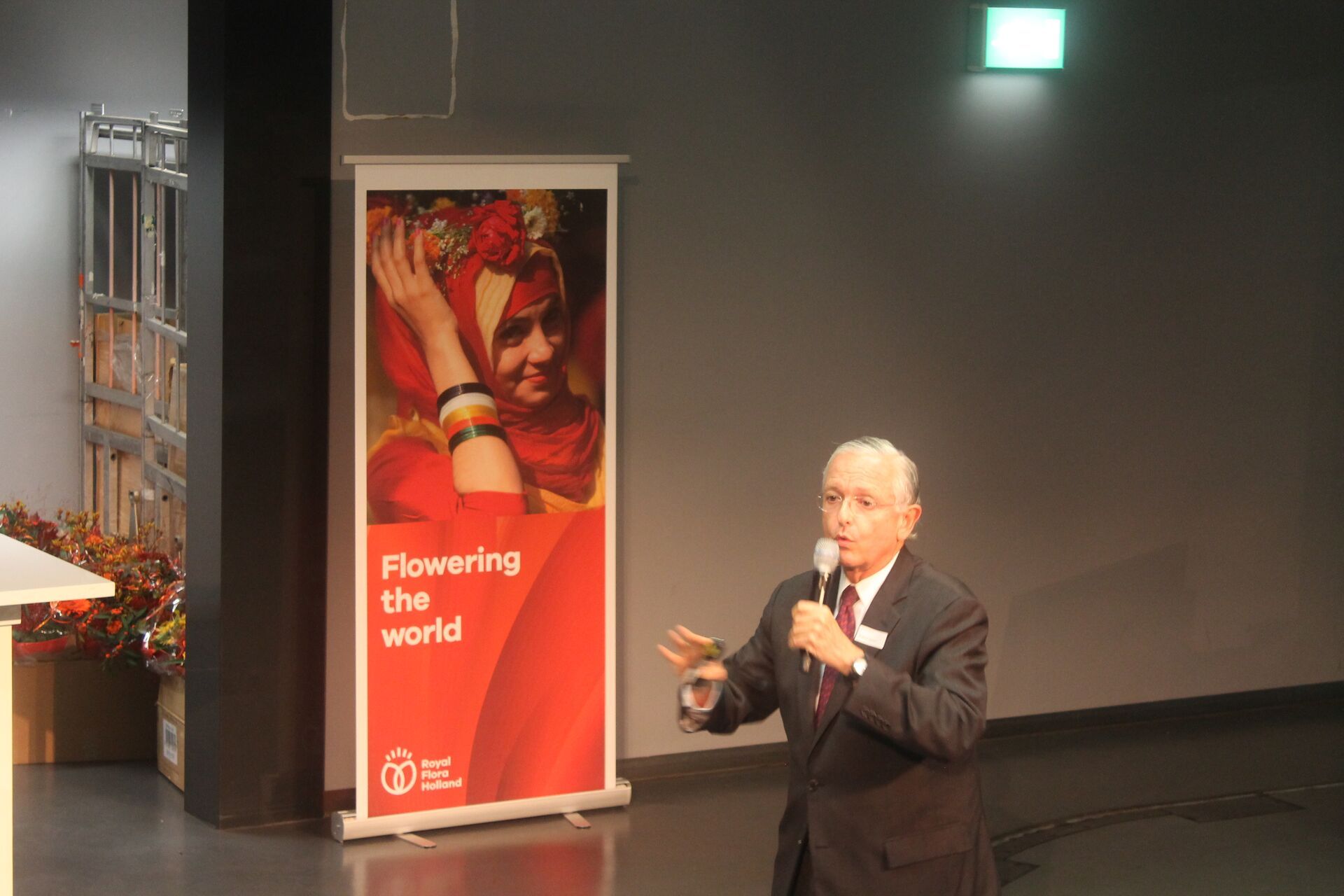Augusto Solano, president of Asocolflores, calls upon the big flower exporting countries to work together. Colombia exports mainly to the United States. Other countries export to Europe. “We don’t know much about each other. We should work together, to release the power of flowers.”
Solano made his appeal at the first World Floral Summit, which was held last Tuesday in one of FloraHolland’s bidding halls in Aalsmeer. What should have been an inspiring international event, ended up being a bit of a lukewarm meeting. Some of the initiators, like Fleuroselect, AIPH, Florint and Ciopora, took an awful long time to introduce themselves. Sylvie Mamias, who took the place of the injured president of Union Fleurs, Herman de Boon, was a welcome exception.

Mamias outlined the five key challenges for the global floricultural industry. First of all, there’s the growth of the market. The per capita income of the world population is increasing and that generally means that the per capita consumption goes up as well. Mamias: “It also leads to more impulse buying, which creates opportunities for plants and flowers. How can we capitalise on that market growth? What’s the best way to take advantage of it, for the entire floricultural chain?”
The second development that was highlighted by Union Fleurs, is the changing production locations for the bulk of the flowers that are exported. Kenya, Colombia, Ecuador and Ethiopia produced 25% of the exports in 2005. That percentage had increased to 44%, equivalent to the Netherlands, ten years later. The growth of Ethiopia in particular, has been very impressive, according to Mamias.
The third challenge is the optimisation of the supply chain. The chain is complex and as we’re dealing with fresh produce, every link in the chain carries a certain risk. But there’s potential for improvement of the chain, according to Mamias. “And there’s still plenty to do with regards to sustainability, although the sector has made some huge steps.”
Digitalisation is the fourth challenge according to Mamias. Marketing, logistics and financing are not going to go away. But the way in which they function, will have to change. Digital platforms are going to bring more efficiency.
The main part of the programme, with Lucas Vos and Jan Rotmans, professor in transition management, was engaging, but very much focused on the Netherlands. A missed opportunity.
The president of Asocolflores also managed to get some speaking time during the World Floral Summit. After a brief introduction of the Colombian floricultural industry, he called upon all the big flower exporting countries to work together. On one side, we’ve got Europe, an enormous market, supplied by mostly African countries, European countries and Israel. And on the other side, we’ve got Colombia and Ecuador. Colombia in particular, is very much focused on the USA. Their exports to America reached more than a billion dollars last year. That’s 78% of the total of 1.3 billion dollars. Solano expects that the Colombian flower export value will go up to 1.4 billion this year. That’s a total of 230,000 ton or 2,700 flights.
“The penetration of flowers in American households is very low. No more than 30% of the households buy flowers at least once a year”, explained Solano in Aalsmeer. So, promotion is very important.
Players on the American market and those on the European market know hardly anything about each other’s activities. Solano discussed some of the marketing projects that the Colombians are running in the USA.
He mentioned four different initiatives: Petal it Forward, Memorial Day, Two Minute Trends and Flowers of Colombia.
Petal it Forward is a promotional event that started in New York City in 2015 and expanded into a nationwide campaign. This year, it reached 467 cities across America and Canada, said Solano.
Memorial Day Flower Foundation has been collaborating with public and private sponsors since 2012, to supply roses and other flowers to military cemeteries throughout the USA. A total of 140,000 stems are placed on veterans’ graves in Arlington, Arizona, Houston and San Francisco.
For Two Minutes Trends, Asocolflores works together with SAF (Society of American Florists), informing design influencers about flowers and motivating them to include flowers in their work.
The fourth project, Flowers of Colombia, focuses on sharing unique stories about Colombian flowers.
Solano feels that the biggest challenge is understanding how to sell flowers to consumers of the future, including the millennials. He called upon the various flower exporting countries to work together. “We don’t know much about each other. We should work together, to release the power of flowers.”
The fifth challenge mentioned by Mamias also related to collaborating. “The dialogue is important and that’s why the World Floral Summit was organised, so that we could get to know each other and interact with each other. We’ve got to move more in the direction of an integrated sector. We’ve got to work together. We’ve all got different voices, but we’re supporting the same game.”




